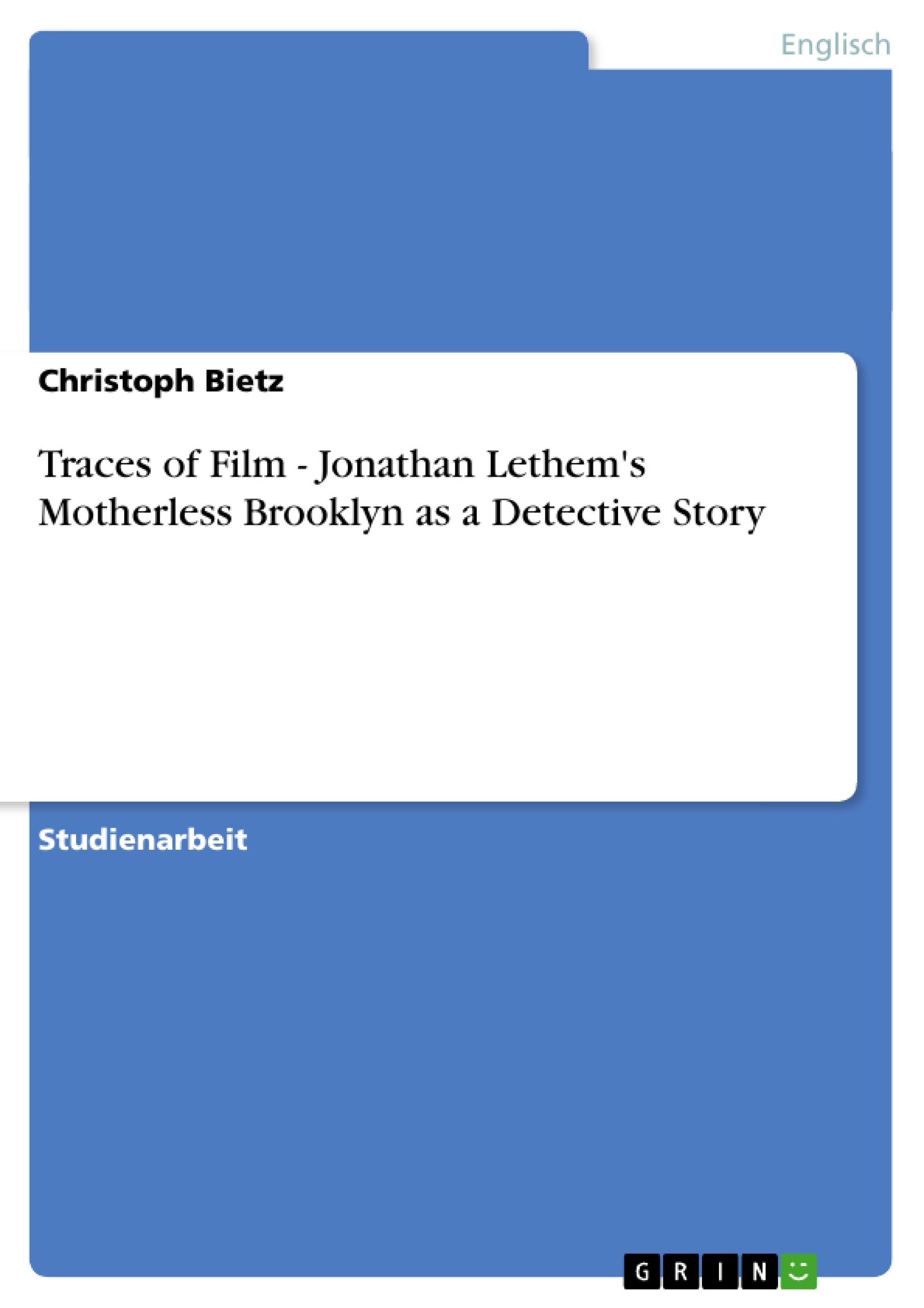Introduction: Jonathan Lethem’s Detective Story Motherless Brooklyn as a Pretext for a Hollywood Movie
Sometimes when we read a book and our imagination is roused by the words we read, we cannot wait for this story being told by a film. We want to see if our imagination fits the ‘real’ pictures on-screen. Having read a novel, there is a quite well- fitting German term that people use when they have liked the story and its characters. The novel has probably had a strong impact on their perception of the plot, and the language seems to have generated longlasting images in their minds. One would – informally – say: ‘This is such a good story. This book is really (now comes the term) filmreif.’ When I read Jonathan Lethem’s Motherless Brooklyn, that was exactly what occurred to me. In this paper, I want to examine theoretically what was a sudden idea, an intuitive feeling in the beginning, and connect film science with literary analysis. The novel can be classified as a detective story as it seems to follow the pattern of a classical detective story, and it shows lots of features that could be read as a prose source for a movie. The narrative, i.e. the story, its subjects or motifs and the way it is told remind one of the typical sujets of the classical Hollywood cinema. It is not uncommon that good (in the sense of critically acclaimed) and successful (in the sense of best-selling) books are ‚translated’ into films – in all kinds of genres and in all kinds of countries. When a film adapts a novel, it has to stand numerous comparisons to its literary predecessor. But whatever the ‘better’ medium for telling a good story is – the history of filmadaptation speaks for the phenomenon of adaptation itself: Many novels turned out to become good and successful films as well. Especially the detective story seems to be made of a pattern that works perfectly for films as well. The Big Sleep by Raymond Chandler and The Moonstone by Wilkie Collins are only two examples for successful film adaptations of classical detective stories. What special pattern is this? ...
Inhaltsverzeichnis
- I. Introduction: Jonathan Lethem's Detective Story Motherless Brooklyn as a Pretext for a Hollywood Movie
-
II. The Novel: Motherless Brooklyn as a…
-
1. Classical Detective Story
- i. Features: The detective, the murder, a riddle and discovery
- 2. Comedy
- 3. Character Sketch
- i. On the Protagonist
- ii. Point of View
- 4. Film Script
-
1. Classical Detective Story
-
III. The Hollywood (Detective) Movie
- 1. Montage
- 2. Narration and Content
- 3. Character and Point of View
-
IV. The Challenge of Adaptation
- 1. Film and Novel as Texts: Medial Differences
- 2. Adaptation versus Transfer
- 3. Codes and Character
-
V. The Film: Motherless Brooklyn as a…
- 1. ...Character Sketch
- 2. Funny Detective Film
- 3. ...Film Script
- i. The Essence of the Scene
- ii. A Script Scene
Zielsetzung und Themenschwerpunkte
Die Arbeit analysiert Jonathan Lethems Roman "Motherless Brooklyn" als klassische Detektivgeschichte und untersucht, inwiefern sich die Geschichte für eine Verfilmung im Stil des Hollywood-Kinos eignet. Die Arbeit untersucht die typischen Merkmale eines klassischen Detektivromans und die Prinzipien des Hollywood-Films, um die Adaptionsmöglichkeiten des Romans zu beleuchten.
- Die Analyse der klassischen Detektivgeschichte
- Die typischen Elemente des Hollywood-Kinos
- Die Adaptionsmöglichkeiten des Romans "Motherless Brooklyn"
- Die medialen Unterschiede zwischen Film und Roman
- Die Herausforderungen der Adaption von literarischen Texten in filmische Formate
Zusammenfassung der Kapitel
Die Arbeit beginnt mit einer Einleitung, die den Roman "Motherless Brooklyn" als klassische Detektivgeschichte mit filmischen Potentialen einführt. Anschließend analysiert die Arbeit die Romanhandlung im Hinblick auf die Merkmale klassischer Detektivgeschichten, beleuchtet komödiantische Elemente und zeichnet den Protagonisten Lionel sowie seinen Erzählstandpunkt nach. Kapitel IV widmet sich der Frage der Adaptionsmöglichkeiten des Romans, untersucht die medialen Unterschiede zwischen Film und Roman und stellt die Herausforderungen der Adaption in den Vordergrund. Die Arbeit endet mit einem Ausblick auf die filmische Umsetzung des Romans, indem sie die Adaption als Character Sketch, Funny Detective Film und Film Script beleuchtet.
Schlüsselwörter
Detektivgeschichte, klassischer Detektivroman, Hollywood-Kino, Filmadaption, mediale Unterschiede, Character Sketch, Funny Detective Film, Film Script, Adaptionsmöglichkeiten, Genrekonventionen, Erzählperspektive, Hollywood-Prinzipien.
- Arbeit zitieren
- Christoph Bietz (Autor:in), 2005, Traces of Film - Jonathan Lethem's Motherless Brooklyn as a Detective Story, München, GRIN Verlag, https://www.hausarbeiten.de/document/42211


